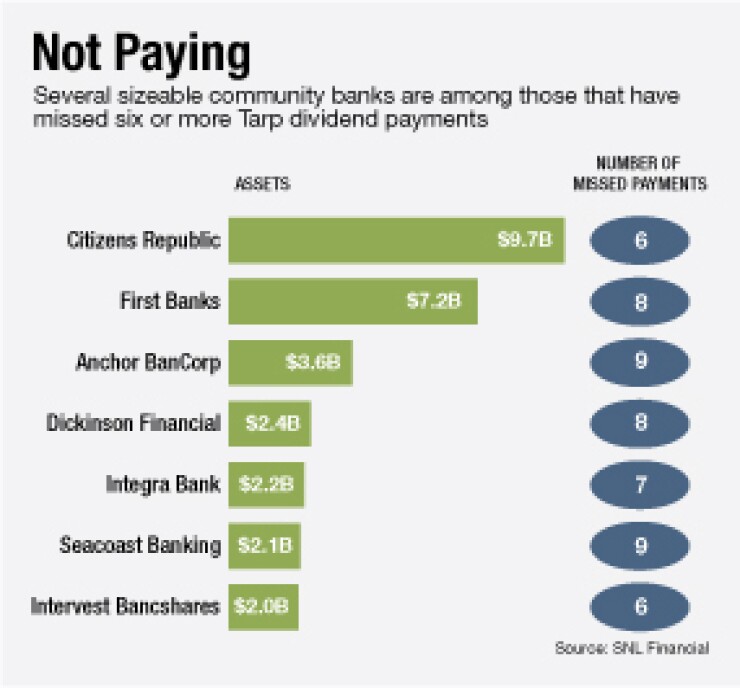-
The Treasury Department has ordered board appointments at two banking companies that have missed dividend payments.
July 19

John Poelker might have been appointed by the Treasury Department to the board of a struggling banking company, but he swears he is not big brother.
The Treasury has the ability to name directors to companies that have missed at least six consecutive dividend payments on its bailout investments. So far, 52 banks fall under that category.
On Tuesday, the Treasury exercised its right for the first time since launching the Troubled Asset Relief Program, assigning Poelker, along with Guy Rounsaville Jr., to the board of First Banks Inc. in Clayton, Mo., and Gerard Thomchick to Royal Bancshares of Pennsylvania Inc. in Narberth.
While the idea of having a government-named director might make some banks squeamish, Poelker says he comes in peace.
"My expectation is that I will join ... and be a director who has the same responsibility to shareholders and regulators just like any other director. I am excited to be a part of it and help where I can," Poelker said in an interview Thursday. "I won't have a reporting relationship with the Treasury. I don't need to talk to them. I am not an employee or a contractor of the Treasury."
James McSwiggan, president and chief operating officer of the $929 million-asset Royal Bancshares said his company's biggest concern when it found out earlier this year that Treasury would soon assign it a director was how that person would interact with the agency.
"If he had reporting requirements back to the Treasury he would have become our de facto chairman and CEO, because what director would take an alternate position to him?" McSwiggan said. "He has the same stature of any director and that is great because it does not add any political aspects to the situation."
"We are pleased with the candidates that Treasury has selected. We think they bring meaningful skill sets to us," said Terrance M. McCarthy, president and chief executive of the $6.9 billion-asset First Banks, in a brief interview.
In an environment where bankers often describe regulators as overzealous and pushy, McSwiggan described the appointment process as straight-forward and seamless. Royal was assigned a case worker who kept management informed. The Treasury asked if it could sit in on a few board meetings to get a feel for the organization. Royal didn't get to independently vet Thomchick, but the Treasury worked with recruiting firm Spencer Stuart on the search. Royal's management team had an chance to meet with Thomchick before the appointment was finalized.
"The whole process was surprisingly uncumbersome. We were impressed," McSwiggan said. "They do try to put you together on a first date to see if there is chemistry."
Thomchick was only added to the holding company's board, but McSwiggan said Royal plans to invite the former chief operating officer of First Commonwealth Financial Corp. in Indiana, Pa., and a former chairman of the governance committee of the Federal Home Loan Bank of Pittsburgh to join its bank board. McSwiggan said he hopes Thomchick stays on with Royal when it regains compliance or repays its $30.4 million in Tarp money.
McSwiggan said Royal is reacting positively to the addition because it was already overhauling its now 13-person board; moving from local business leaders that bring in clients to people who know banking. It recently recruited a former CEO of a Midwest bank and a former regulator. While well-capitalized, the bank's nonperforming assets made up more than a 10% of total assets at March 31.
"It was fortuitous timing for us," McSwiggan said. "For a bank in our condition, we have a lot of work to do and we need independent directors to help us. We can use the extra hands."
Likewise, Poelker said he is excited to bring his expertise, which includes serving as the chief financial officer at Old National Bancorp in Evansville, Ind., to First Banks. "I'm confident I know what I am doing because I've been in the industry so long. I understand the challenges," Poelker said.
Finding experienced directors has become difficult at small banks, particularly those that are struggling, said Susan O'Donnell, a managing director at Pearl Meyer & Partners LLC, an executive search firm.
"In the past, being a board member meant coming in once a month, you have dinner, you do your thing. Now it is three-and-a-half hour meetings with lots of work before and after," she said. "It has gone from being an honor to serve to a huge responsibility to serve."
Jeffrey C. Gerrish, a partner at Gerrish McCreary Smith, says that although good directors are hard to find, he struggles to see the positive in having one assigned by the government. "These guys might be qualified and may contribute to the board, but I just can't see it as helpful to have a representative from your principal creditor on the board," he said.





